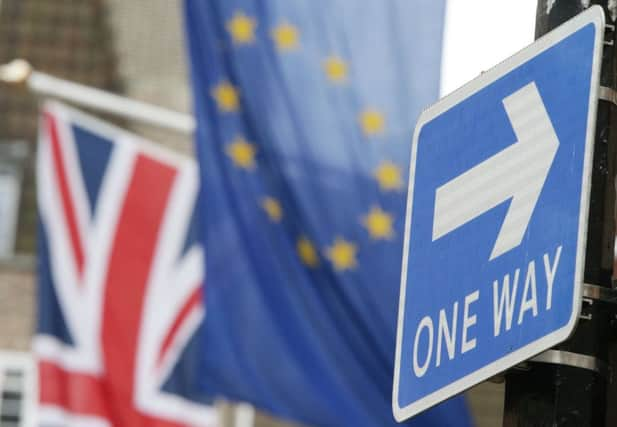YP Comment: Article 50 is just end of beginning


It’s a key distinction – one reason for Britain’s economic resilience since last June’s EU referendum is because the status quo remains in place, and will do so, until March 2019 when Brexit Secretary David Davis expects a deal to be concluded.
Yet Ministers should be under no illusion about the scale of the task that now awaits. This is unprecedented territory – no one has experience of a renegotiation like this – and the final outcome will determine not only Britain’s future economic trajectory but the very existence of the United Kingdom.
Advertisement
Hide AdAdvertisement
Hide AdThese talks need to be conducted with purpose, diplomacy and humility. The public and Parliament have a right to be kept informed. The Government’s primary duty is to the whole country, and not just the 52 per cent of voters who backed Britain’s departure from the European Union.
Nothing should be ruled in or out, not least membership of the single market. And there needs to be a viable plan B in the regrettable event of a satisfactory deal not being brokered – David Cameron’s greatest failing, and there were many, was his Government’s lack of readiness in the event of the Leave campaign prevailing.
Yet the Government does not enter this process from a position of strength. Its attempts to circumvent Parliament over Article 50, and then the fallout from last week’s Budget, namely increases in National Insurance for the higher-earning self-employed, do not inspire the greatest of confidence. If Ministers are to achieve the best possible deal, they must now focus on the policies – and not the personalities of those concerned – as Budget recriminations overshadow the EU referendum vote now being formalised.
Turning the tide
IT will inevitably take time for perceptions to change about Rotherham following the borough’s shameful child abuse scandal – this remains one of the country’s worst ever safeguarding scandals.
Advertisement
Hide AdAdvertisement
Hide AdHowever it would be remiss not to acknowledge the latest Ofsted inspection which has singled out the “positive organisational culture” in Rotherham Council’s children’s services department for particular praise. What a contrast to the damning findings of two years ago.
Though there is clearly more work to do, and Ofsted continues to identify areas where improvements are still required, it was always going to take time to change the culture of an organisation which – for too long – ignored the cries of help from young girls, and women, who had been groomed, and then sexually abused, by gangs of predominantly Asian men, for fear of being branded racist.
That said, it’s heartening that Ian Thomas, Rotherham Council’s strategic director for children, wants to “put the past firmly into the past” and that his “loyal, dedicated and highly motivated” staff share this objective.
It’s also significant that this change of mindset is being brought about by a proactive ‘recruitment and retention’ policy that actually makes Rotherham an attractive proposition for social workers whose harrowing work is often under-valued. Recognising that continuity is also essential when it comes to dealing with vulnerable youngsters, Rotherham’s example is one that other councils would be minded to follow – a state of affairs which could not have been envisaged two years ago.
Change of gear
Advertisement
Hide AdAdvertisement
Hide AdTRANSPORT Secretary Chris Grayling’s glibness demonstrates that he is not a regular bus user – he does, in fact, commute to and from Westminster by train each day.
However, if he travelled by bus, he would appreciate that this ‘Cinderella’ service is a lifeline to many and requires even greater investment, from both the public sector, and private operators, if more services are to be commensurate with the needs of passengers and an increasingly transient workforce.
Yet new research points to 500 routes being withdrawn because local councils simply can’t afford to run them.
Yes, there will be occurrences when services should be cut because passenger usage does not justify the subsidy level, but there are now occasions when cuts, coupled with reliability issues, impinge upon the ability of non-car users to get to and from work promptly.
Buses are a public service and Mr Grayling needs to find a change of gear in his approach.